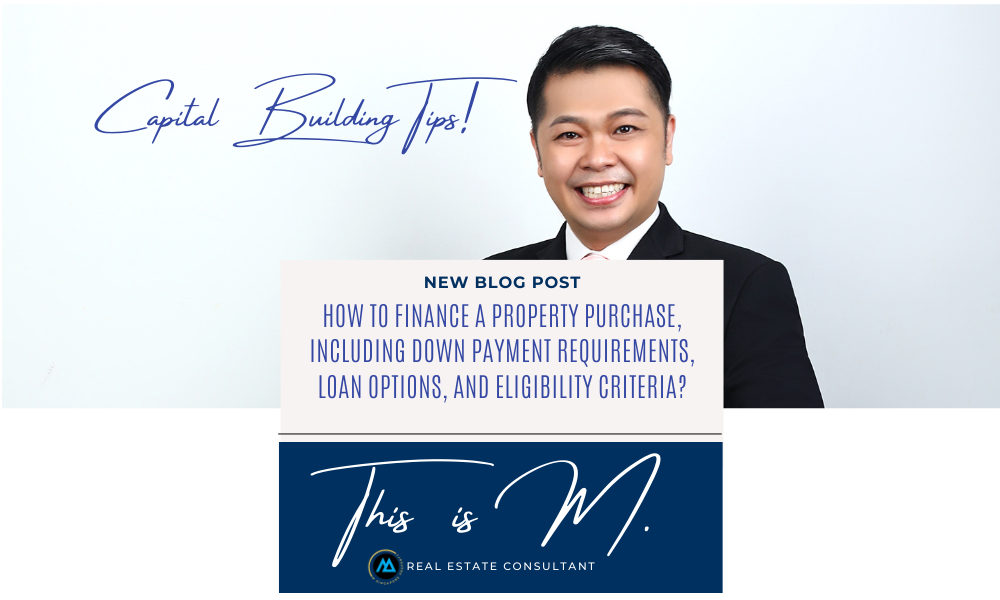Financing a property purchase involves several key aspects, including down payment requirements, loan options, and eligibility criteria. Here’s a more detailed explanation:
Down Payment Requirements:
- Down Payment Percentage:
-
- In Singapore, the down payment for a property purchase is generally a percentage of the property’s purchase price. The down payment is often referred to as the “cash downpayment.”
- Cash Downpayment for Residential Properties:
-
- For residential properties, such as private condominiums and landed houses, the standard down payment is typically 25% of the purchase price. This means that the buyer needs to pay 25% of the property’s value in cash. Typically 5% is in cash and the remaining 20% can be paid using CPF(Central Provident Funds)
- Cash Downpayment for Executive Condominiums (ECs):
-
- For ECs, which are a type of public-private housing in Singapore, the down payment is initially 5%. The remaining 20% can be paid using CPF (Central Provident Fund) savings or in cash.
- Cash Downpayment for HDB Flats:
-
- For HDB flats, the down payment is can be either 20% using CPF ordinary account saving and cash using housing loan from HDB or 5% cash payment and remaining 20% CPF Ordinary Account or cash using Financial Institution with Loan to value limit of 75%
Loan Options:
- Bank Loans:
-
- Most property buyers in Singapore finance their purchases through bank loans. Banks offer housing loans with varying interest rates and loan tenures.
- HDB Loans:
-
- The Housing and Development Board (HDB) provides housing loans for the purchase of HDB flats. These loans are available to eligible Singapore citizens.
- CPF Usage:
-
- Buyers can use their CPF savings (Central Provident Fund) to finance a portion of the property purchase. The CPF can be used for the down payment, monthly mortgage payments, and other related costs.
- Interest Rates:
-
- Interest rates on housing loans can be fixed, floating, or a combination of both. Fixed-rate loans offer stable monthly payments, while floating-rate loans may change with market conditions.
- Loan Tenure:
-
- The maximum loan tenure is typically 25 to 30 years. The longer the loan tenure, the lower the monthly installment, but it may result in higher overall interest payments.
Eligibility Criteria:
- Income Requirements:
-
- Lenders assess the borrower’s income to determine loan eligibility. Income includes both salary and other sources of regular income.
- Total Debt Servicing Ratio (TDSR):
-
- TDSR is a measure that limits the amount a borrower can spend on loan repayments, including the mortgage, car loans, and other debts. It is capped at 55% of the borrower’s gross monthly income.
- Loan-to-Value (LTV) Ratio:
-
- The LTV ratio represents the percentage of the property’s value that can be financed through a loan. LTV limits are set by regulatory authorities and can vary based on factors such as the property type and the number of existing properties owned by the borrower.
- Credit Score:
-
- A good credit score is essential for loan approval. Lenders assess the borrower’s creditworthiness based on factors such as credit history, outstanding debt, and repayment behavior.
- Age Restrictions:
-
- There may be age restrictions on loan tenure, especially for older borrowers. This is to ensure that the loan is repaid before the borrower reaches a certain age.
- Citizenship and Permanent Residency:
-
- Some loan options are available only to Singapore citizens or permanent residents. Foreigners may have specific eligibility criteria and may be subject to additional fees and taxes.
Additional Considerations:
- Legal Fees and Other Costs:
-
- Buyers should also budget for legal fees, stamp duties, and other transaction costs associated with property purchases.
- Market Conditions:
-
- Interest rates and market conditions can influence the cost of financing. Buyers should be aware of economic factors that may impact mortgage rates.
- Professional Advice:
-
- Engaging with mortgage brokers, financial advisors, and real estate professionals can provide valuable insights and help navigate the financing process.
Understanding the intricacies of property financing is crucial for making informed decisions. It’s advisable to seek professional advice, carefully read the terms of any loan agreements, and consider one’s financial capacity before committing to a property purchase.

